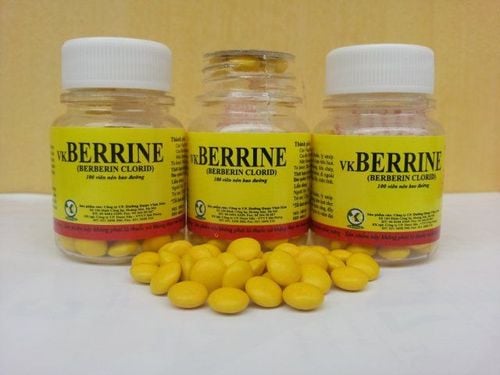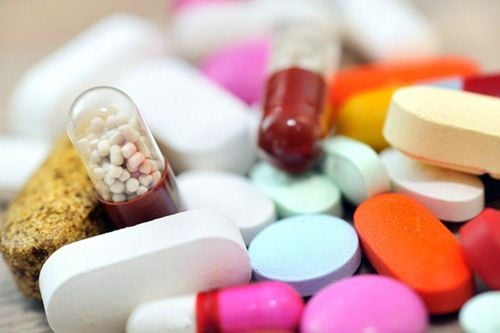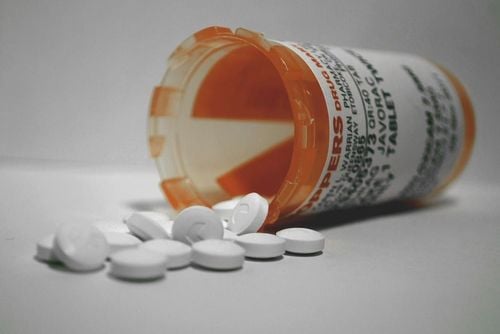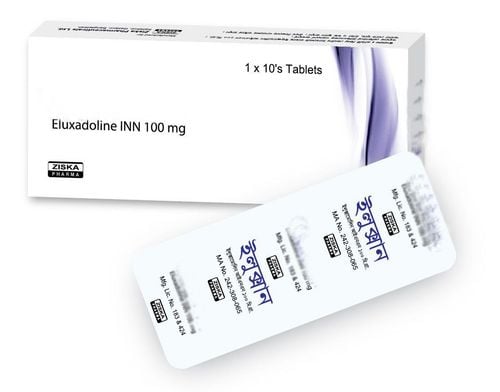This is an automatically translated article.
Diarrhea is a condition that almost everyone experiences at least a few times in their life. When experiencing diarrhea, many people immediately think of taking anti-inflammatory drugs to overcome. So do anti-diarrheal drugs have antibacterial effects?
1. Causes of Diarrhea
Diarrhea is the passage of loose, raw stools 3 or more times a day. Accompanying diarrhea are other symptoms such as abdominal pain, bloating, vomiting, indigestion, fatigue... In many cases, antibiotics can be used to treat diarrhea to overcome this condition.
Diarrhea is usually classified into 2 groups as acute diarrhea (usually gone in 1-2 days, not lasting more than 1 week) and chronic diarrhea (lasting 2-4 weeks and even more).
There are many causes of diarrhea, it can be due to unhygienic eating, environmental changes or unhealthy living habits. However, diarrhea can also be a sign of many diseases such as:
Bacterial infection, viral infection or parasitic infection. Due to the use of antibiotics. Allergies or food poisoning. Irritable bowel syndrome . Crohn's disease. Ulcerative colitis disease. Celiac disease. Of these causes, bacterial diarrhea is the most common. Common bacteria causing diarrhea such as: Vibrio cholerae, E. coli, staphylococcus, Clostridium difficile, Shigella, Salmonella....
Diarrhea if not treated promptly and properly will easily lead to dehydration , exhausted and even life-threatening. Therefore, when encountering this condition, many people choose to use anti-diarrheal drugs to treat it.
2. Commonly used anti-diarrheal drugs
Some commonly used anti-diarrheal drugs are:
2.1. Berberin medicine Berberin is a medicine to treat diarrhea that is no longer strange to all Vietnamese people. This medicine is almost present in the medicine cabinet of every Vietnamese family.
The drug contains herbal ingredients with very good antibacterial and anti-inflammatory properties, helping to treat some inflammatory lesions. To use the drug to achieve the best effect of diarrhea treatment, you need to take the correct dose according to the instructions for use to limit possible side effects.
2.2. Diphenoxylate Diphenoxylate is a medicine that reduces intestinal motility and intestinal contractions effectively. Therefore, the drug is often prescribed by doctors to treat repeated diarrhea. In addition, this drug has the ability to make the amount of water and electrolytes in the intestine move more slowly. Thereby, increasing the absorption of water and electrolytes, limiting dehydration. The drug can cause some side effects for users such as dry mouth, headache, rash, constipation...
2.3. Anti-diarrheal drug Smecta This medicine works to coat the lining of the colon, thereby helping to reduce irritation and reduce the number of bowel movements. Smecta is not an antibiotic, so it is not effective in treating bacterial infections.
2.4. Loperamide Loperamide is an anti-diarrheal drug that reduces the number of bowel movements without affecting the central nervous system. The drug is usually prescribed for acute diarrhea and some chronic diarrhea conditions. Possible side effects of using this medicine can be allergies, rashes, and constipation.
2.5. Pepto Bismol Pepto Bismol is a specialized product for the treatment of digestive and stomach problems. The drug contains the ingredient bismuth subsalicylate, which heals the stomach lining, promoting the contraction of the stomach to digest food. Therefore, it helps to reduce the number of diarrhea, improve stomach pain, heartburn, indigestion, nausea and vomiting...
2.6. Codeine anti-diarrheal drug Codeine is an antibiotic drug to treat diarrhea with the main ingredient being Codeine phosphate, which reduces pain and regulates intestinal motility. Medicines are often prescribed by doctors to treat diarrhea that is accompanied by abdominal cramps or diarrhea caused by bacteria.
2.7. Racecadotril The drug is prepared in the form of tablets, capsules and oral suspension with the main use of treating acute diarrhea. Racecadotril works by inhibiting the enzyme enkephalinase in the gastrointestinal tract. This leads to a decrease in secretions and prevents electrolyte loss, reducing the frequency of diarrhea.
2.8. Probiotics Inside the intestinal tract is a microflora consisting of both good and bad bacteria. When the intestinal microflora is out of balance due to infection, stress, antibiotics... can lead to diarrhea.
Probiotics are preparations that provide beneficial bacteria for the intestinal tract. Take probiotics as well as an anti-diarrheal medication, traveller's diarrhea. Supplementing with probiotics along with rehydration and electrolytes is a safe way to manage diarrhea, with few side effects, and a healthier digestive system.
3. So do anti-diarrheal drugs have antibacterial effects?
For this problem, doctors say that not all anti-diarrheal drugs have antibacterial effects. Depending on the cause of diarrhea, the doctor will prescribe the most appropriate and effective medication for the patient.
For cases of bacterial diarrhea, the doctor will prescribe anti-diarrheal drugs with antibacterial effect. Prevent and inhibit the growth of bacteria that cause diarrhea, thereby helping to treat diarrhea effectively.
Therefore, patients are absolutely not allowed to arbitrarily use anti-diarrheal drugs without consulting and without the appointment of a specialist. The use of the wrong medicine, the wrong cause of the disease will make the diarrhea worse and have a serious impact on health.
For the most effective and definitive treatment of diarrhea, patients should go directly to medical facilities to be examined, diagnosed and treated by a specialist.
4. Some notes when taking anti-diarrheal drugs
When using medicine to treat diarrhea, the patient should also pay attention to the following issues to ensure safety:
Do not treat diarrhea at home if you have a history of liver disease or are taking other drugs , there are signs of infection. By this time you may need to take antibiotics or other more suitable medications. Do not arbitrarily use diarrhea medicine for infants and young children, so take the baby to the doctor to be prescribed appropriate medicine. Do not arbitrarily buy anti-diarrheal medicine to use, but consult your doctor before intending to take any medicine. When taking the drug, carefully read the information on how to use it and the dosage. In the process of taking antibiotics for diarrhea, patients should supplement beneficial bacteria for the digestive tract with probiotics to help balance the intestinal flora. If after taking the medicine after 7 days, the diarrhea symptoms still do not go away, you should consult your doctor to be prescribed, adjust the drug, and have a more suitable treatment. Long-term diarrhea will cause dehydration, so you need to replenish water and electrolytes for the body. If you are pregnant, nursing or have a history of allergies to any of the ingredients, or are taking other medications, you should inform your doctor for appropriate advice and indications. Hope the above information has helped people better understand about anti-diarrheal drugs. From there, there is a way to use anti-diarrheal drugs effectively, quickly and safely.
Please dial HOTLINE for more information or register for an appointment HERE. Download MyVinmec app to make appointments faster and to manage your bookings easily.













